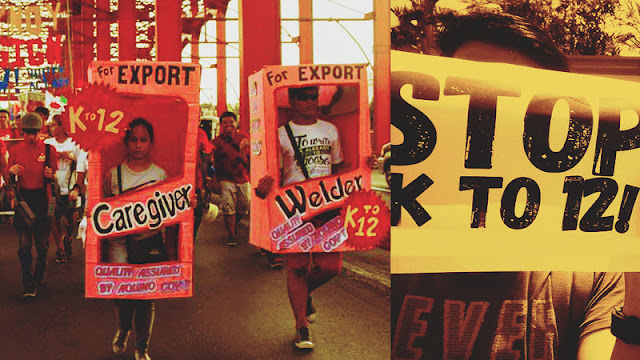The last two years of DepEd's K to 12 offer four different tracks. Young students are therefore required to consider what career they want to pursue later in life. The tracks share a set of core courses, but the differences still matter and the question of how pupils can thoughtfully consider which track to choose remains to be addressed. In 2014, a study made by the
Department of Labor and Employment in the Philippines recommended the opening of several jobs in the Philippines. One of the occupations listed as suffering from shortage is guidance counseling. With K to 12, this shortage clearly would be felt more strongly.
Last Friday, I participated in a
career fair at Mason Crest Elementary School. The fair was organized by the school's two guidance counselors. Fourth and fifth graders went through more than a dozen booths, each one showcasing a particular career. I was there as a scientist and professor.
With each set of students visiting my booth, I started with a quiz asking them which animal they thought was the deadliest. Some students did get the right answer: the mosquito. And they also knew the reason: Mosquitoes transmit some of the deadliest diseases in the world, one of which is malaria. Then I told them how the world is facing the need for new drugs because current medicine is now fast losing their effectiveness because of drug resistance. And then I followed that with the question of who they thought had the job to find those new drugs. That then helped me explain what it takes for a person to become a scientist/professor. These are difficult problems to solve and thus require a lot of education and training. I also mentioned that not all science students actually end up working as a scientist later in life. There is Margaret Thatcher and Angela Merkel. And, of course, the head of the Catholic Church is a good example.
I also added that I never took any formal course in college or graduate school that is directly related to malaria. I did not quiz the students any further because I had to be nice since the person next to my station was a judge.
The other occupations represented in the fair are listed below.
The careers shown above are in great contrast to those cited by the students below who are rallying against DepEd's K to 12:
The economy can change dramatically that it is important to consider what education level is resilient especially during hard times. Resiliency can likewise change with time depending on so many factors. The most recent recession in the United States paints the following picture, for instance (This figure is from a study made by the
Center on Education and the Workforce at Georgetown University.)
The first major recession in the 21st century in the United States shows a "college advantage". More than 5 million jobs were lost for those with only a high school diploma or less.
It is not straightforward to predict what the future holds especially in terms of careers to choose. This only highlights the importance of a basic education that does not confine students to a limited set of options. The shortage in guidance counselors combined with the high specificity of tracks in senior high school are obvious weaknesses in DepEd's K to 12. It is easy to see then why the petition posted on
Change.org starts with the following point:
K-12 will increase joblessness and depress wages, reinforce labor export.






Comments
Post a Comment